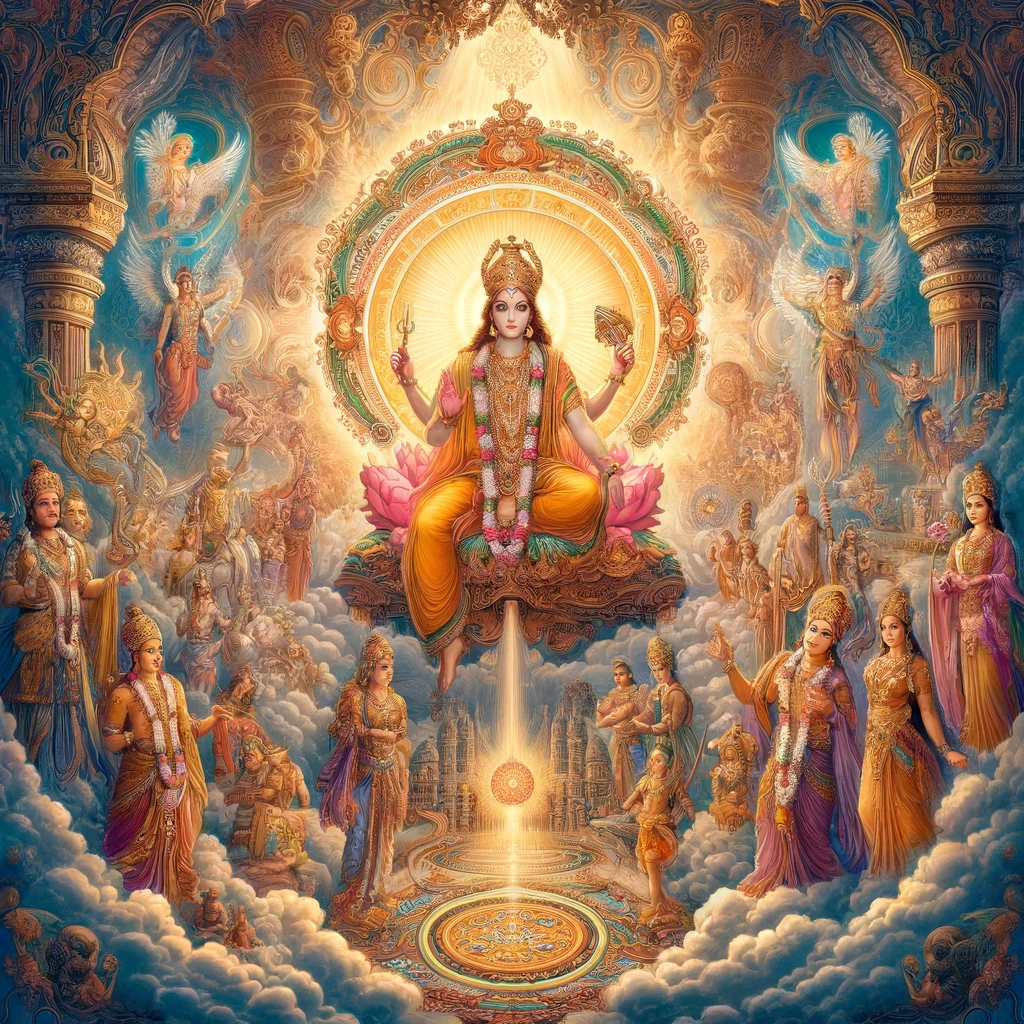ಮರೇಚಿಃ ದಮನಃ ಹಂಸಃ ಸುಪರ್ಣೋ ಭುಜಗೋತ್ತಮಃ
ಹಿರಣ್ಯನಾಭಃ ಸುತಪಾಃ ಪದ್ಮನಾಭಃ ಪ್ರಜಾಪತಿಃ
mareciḥ damanaḥ haṃsaḥ suparṇo bhujagottamaḥ
hiraṇyanābhaḥ sutapāḥ padmanābhaḥ prajāpatiḥ || 21||
Marichi: (ಮರೇಚಿಃ)
Marichi, residing in the rays of the sun, is the bestower of life force to all living beings in the universe. 'Mari' signifies the cloud filled with water. Marichi imparts movement to the clouds and causes rainfall.
As mentioned in the Gita: "Yadāditya gatam tejo jagad bhāsayate'skhilam | Yaccha candra masi yacchāg tatt tejo viddhi māmakam ||" “ಯದಾದಿತ್ಯ ಗತಂ ತೇಜೋ ಜಗದ್ ಭಾಸಯತೇsಖಿಲಮ್ | ಯಚಂದ್ರ ಮಸಿ ಯಚ್ಚಾಗ್ ತತ್ ತೇಜೋ ವಿದ್ದಿ ಮಾಮಕಮ್ ||” (Bhagavad Gita, Chapter 15, Verse 12)
It means, "The light in the sun that illuminates the whole world, the light in the moon, and the light in fire—all of them know to be Mine." In this way, the Bhagavan (Lord) who is the source of the abundant light in all living beings is Marichi.
Daman: (ದಮನಃ)
During the time of the cosmic dissolution (pralaya), when the entire creation is absorbed back into the sun's rays and then into water (jalapralaya), the same sun bestows restraint by controlling the water, symbolizing yoga nidra (the divine sleep of Yoga).
For the righteous, the Lord is 'Dama,' meaning the bestower of self-control, showing compassion. For the wicked, the Lord is 'Daman,' signifying the destroyer (of their ego and sins).
Hamsa: (ಹಂಸಃ)
Blameless, in the form of essence, the one who destroys the cycle of birth and death (samsara) for all beings, the inner controller within all, the one who fills everything and everywhere—such is the Lord as 'Hamsa.'
Suparna: (ಸುಪರ್ಣೋ)
The Lord, who resides within Garuda (the divine eagle), is full of undisturbed bliss. He is the one who imparts perfection to beings through their respective efforts. For each individual, the Lord bestows bliss according to their capacity. He is 'Suparna.'
Bhujagottama: (ಭುಜಗೋತ್ತಮಃ)
The highest truth that resides in Garuda's wings, the embodiment of endless and flawless bliss, the one who imparts perfection through spiritual practice, and the bestower of limitless joy according to each individual's eligibility is 'Bhujagottama.'
ಹಿರಣ್ಯನಾಭಃ (hiraṇyanābhaḥ)
Hiranya means gold. Hence, Hiranyanabha refers to the universe that is like a golden egg and the one who carries the golden egg in the navel. Another name for the universe is Virat, which is like the glittering golden egg. When standing far away from the earth, the earth itself shines like a star. During the time of dissolution, the Lord holds everything within His stomach, and during the time of creation, He creates this universe, from the golden egg and is known as Hiranyagarbha. In addition, Hiryanya means beneficial and beautiful. The Lord is beneficial and beautiful to everyone and exists as a reflection within everyone.
ಸುತಪಾಃ (sutapāḥ)
Sutapaha refers to those who practice austerity. Here, tapas means deeply contemplating and meditating upon a subject. Sutapaha denotes one who possesses comprehensive knowledge and profound understanding. When we analyze this name, 'sut' means children, and 'paa' means caretaker. Everyone is a child of the Lord. There is no distinction of higher or lower. The Lord impartially bestows the fruits of their past actions to all His children and guides them accordingly. Sutapaha can also be understood as 'su,' representing pure joy, 'ta,' signifying knowledge (attained through meditation), and 'paa,' denoting the supreme protector who is the embodiment of bliss. Therefore, Sutapaha represents the Lord who is of the nature of Sat (truth), Chit (consciousness), and Ananda (bliss)."
ಪದ್ಮನಾಭಃ (padmanābhaḥ)
When we compare this universe to a lotus flower. The one from whose navel this magnificently created world emerged is known as Padmanabha.
ಪ್ರಜಾಪತಿಃ (prajāpatiḥ)
The term 'Prajapati' means the lord or protector of all living beings. Here, 'pati' means 'protector.' Prajapati is also referred to as the four-faced Brahma. Brahma, the deity who identifies with the essence of life, is indeed Prajapati. However, even Brahma is considered a praja, a being. Prajapati is the divine protector who safeguards both all living beings and Brahma himself. Furthermore, 'praja' also means 'knowledge,' so Prajapati is the protector of divine knowledge. In our tradition, there is a belief that those who do not have offspring should not study the Vedas. This notion is indeed mentioned in the scriptures. However, in that context, the term 'makkalu' refers to the disciple category. Those who cannot transmit the knowledge they have acquired to others cannot ensure the preservation of knowledge. Therefore, they are not allowed to teach the Vedas. The attainment of good fortune does not solely depend on having offspring. It is determined by the actions we perform. Moreover, the Puranas state, 'One without progeny has no salvation.' However, the true meaning is that if we do not pass on the knowledge we have gained to the next generation, who possess prajna or consciousness, then salvation cannot be attained by such individuals. Prajapati, the protector of knowledge, uplifts those who bestow knowledge and liberation. The act of giving knowledge is an inseparable part of the preservation of divine knowledge. To safeguard knowledge, Sri Krishna imparts wisdom to Dharmaraja through Bhishma, who was lying on a bed of arrows, thereby ensuring the protection of knowledge. In this way, the lord of knowledge and its protector is Prajapati.


